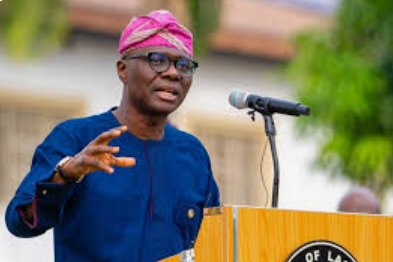
Nigeria’s commercial hub, Lagos, is renowned for its traffic challenges. The problem is compounded by the fact that, despite being surrounded by water, most of its residents rely on the road as their primary mode of transportation, leading to constant road congestion. This results in the loss of countless man-hours every day due to traffic gridlock.
According to the Global Traffic Congestion Rankings 2023 by Traffic Index, Lagos State has the worst road traffic among all cities with at least 500,000 inhabitants worldwide.
However, the Lagos State Government has taken steps to reverse this trend by investing in other modes of transportation throughout the metropolis. Between 2023 and the present year, the government has launched two metro train lines – the Blue and Red lines.
The 27-kilometre Blue metro train line runs from Marina to Mile 2 and has moved over 80,000 passengers since it was launched on September 4, 2023, according to Lagos Metropolitan Area Transport Authority.
The Red Metro line, a 37-km train line that shares the right-of-way with the Lagos–Kano Standard Gauge Railway, currently runs from Oyingbo in Lagos to Agbado in Ogun State.
It was inaugurated on February 29, 2024, and is expected to move 500,000 passengers in 37 trips daily.
Another option the state government has been exploring is water transport.
However, this mode of transportation is still facing a lot of challenges like poor state of the boats, and negligence to laws guiding navigation among others. These challenges have made water transportation a nightmare as people are often scared of mishaps.
The PUNCH reported that the Lagos Area Manager of the National Inland Waterways Authority, Sarat Braimah in February, said that 75 per cent of boats that operate on Lagos Waterways were not seaworthy.
Braimah, disclosed this while addressing journalists during a meeting with members of the Association of Tourist Boats Operators and Water Transport, Lagos, to tackle the issue of boat mishap.
The meeting was coming after a boat mishap that happened in the Ibeshe-Ikorodu Area of Lagos State where three persons had been confirmed drowned after a boat ferrying 14 passengers capsized.
“75 per cent of the boats on the Lagos waterways are not seaworthy. The time they bought them, we registered them but the maintenance has dropped and their life span has also dropped. So, we want a way that even if it is 20 boats that are fit to operate let it be so,” she asserted.
Braimah explained that the agency wanted to sanitise the boats to ensure that accidents were prevented.
“From these two major accidents that happened this year, we have been able to analyse our investigations and discovered that they were all human errors.
“When I say human error, I mean the maintenance of the boats, because sometimes their engines would go off when they are in transit. Because of the speed they need they won’t get it on the channel, so they would move out of the channel to get the speed their boats need,” she continued.
So far in 2024, Lagos State has recorded nothing less than two boat mishaps that claimed the lives of three people and about 111 persons rescued from drowning.
In 2022, it was reported that over 75 Nigerians died in boat accidents that occurred in Lagos, Niger, Sokoto, and the Bayelsa States.
Government’s intervention
In response, the government has taken several measures to address the issue of boat mishaps. One such intervention was the introduction of the unsinkable boats by the Lagos Area Office of NIWA a few weeks ago.
The agency in March, handed over 60-seater boats to the Association of Tourist Boat Operators and Water Transporters of Nigeria for operations along the volatile Ikorodu route. The boat with two outboard engines at 350 horsepower each was equipped with a deck above and two toilets, one for males and the other for females.
Another major intervention was the partnership between the Lagos State Government and an indigenous boat manufacturing company, Caverton Marine Boats Plc for the manufacturing of 25 new boats to ease waterways movement in the state.
During a recent facility tour of the facilities of Caverton Marine Boats in Lagos, the Chief Executive Officer of the firm, Olabode Makanjuola, said that the state being a coastal city with an extensive network of waterways, has a huge potential for water transport which had been underutilised for years.
“Today marks a significant milestone in our journey towards revolutionising water transportation in Lagos State. Lagos, being a coastal city with an extensive network of waterways, has a huge potential for water transport, which has been underutilised for years.
“The challenges of road congestion and pollution have highlighted the need for alternative modes of public transportation that are efficient, reliable, and environmentally friendly,” Makanjuola stated.
He maintained that recognising the pivotal role that water transportation could play in decongesting Lagos roads and improving the overall quality of life for Lagosians, Caverton, in collaboration with the Lagos State Government, was planning the construction of new, state-of-the-art ferries, each with a 40-passenger capacity.
He added that the ferries were a testament to the firm’s commitment to providing a viable and efficient water transportation system that would serve as an integral part of the state’s transportation infrastructure.
According to Makanjuola, aside from providing waterways transportation services, domesticating the manufacturing of boats will help the state live up to its ‘state of aquatic splendour’ glory and help Nigeria save cost in all ramifications that would have accrued should those boats be imported like before.
At the event, the General Manager of the Lagos State Waterways Authority, Oluwademilola Emmanuel, said over the years, the state government had been committed to ensuring sustainable development of water transportation.
Emmanuel noted that the partnership with Caverton Marine was a public-private collaboration, aimed to enhance the efficiency of the state’s waterways transport system by constructing locally made boats that meet international standards and place the state on the global map.
He added that the local manufacturing of boats was key considering the cost of exports and even imports as well.
“We want to export out of Lagos and we know what the heavy cost of being able to import boats into Nigeria has been.”
“So, the fact that we can make boats that are of international standard in Lagos is a plus for Lagos State and it shows that Lagos State continues to lead the line. So, there is no reason we shouldn’t be making standard boats for the movement of our citizens in Nigeria from point A to point B.
“So, bringing you here today is to see what Lagos State is doing to plug this gap as well and, of course, to show you that there is still more to be done and we hope that there will still be many more of this kind of initiative as well, not only in Lagos State but also in Nigeria as a whole,” he remarked.
Emmanuel, while highlighting that boosting local boat production would significantly reduce capital flight, noted the high cost of boat importation.
He emphasised the state government’s commitment to the sustainable development of water transportation, pointing out the critical importance of local boat production, especially given the rising costs of imports and exports.
The Permanent Secretary of the Lagos State Ministry of Transportation, Mr Olawale Musa, expressed confidence in the quality of the ferries, which he believed would enhance the safety and comfort of boat transport.
He revealed that 15 of the 25 ferries would soon be launched and deployed to improve the safety, life, and security of transporters.
He added that with the latest technology integrated into the ferries, the state government would be able to monitor the waterways more effectively and address gaps in the water transport system.
The Commissioner for Transportation, Lagos State, Mr Oluwaseun Osiyemi, declared, “The importance of you coming around is to be able to, of course, at the building stage, make your inputs.”
Challenges
The Caverton CEO opined that even though foreign exchange had been one of the major challenges with local manufacturing in Nigeria as one had to source for forex to import, it also provided an opportunity for local manufacturers to improve.
“Once you are into manufacturing of boats locally, you find out that the raw materials are not available here. So, you have to import. It is the sad part, especially when it comes to the issue of foreign exchange.
“However, the company sees the foreign exchange issue in Nigeria as a blessing in disguise. It now supports local raw materials producers to produce to specification and through its insistence on the standard.
“It also insists on the ability of local manufacturing that it does so that no foreign producer will come and take the glory. This way, Nigeria is not projected as fake in the face of foreigners, and Nigeria, like China, will grow from strength to strength.”
Aside from the local construction of boats, operators, including members of the Association of Tourist Boats and Waterways Transport of Nigeria, believed there was a need for more government interventions that would help members acquire those boats on hire purchase bases.
The National President of ATBOWTAN, Tarzan Balogun, said, “We are not asking the government to give us boats. We are asking them to get the standard boats for us to pay back. They would get the money back because we have serious-minded businessmen here.
“The cheapest boat I have seen can’t be less than N6m-N8m. So, if someone can bring that amount it means that person is a serious-minded businessman.
“So, we are appealing to you through the Minister of Marine and Blue Economy to buy these boats and give them to us. To acquire that kind of boat we are talking about N50m. Boats can be manufactured here in Nigeria. Maybe we can import the engines,” Balogun explained.
Meanwhile, Caverton’s chief executive believed that the initiative was far from being a mere corporate social responsibility gesture, stressing that it was a strategic economic development project aimed at bolstering the economy of Lagos State.
“By providing a more effective way for commuters to navigate the city, we are not only easing the daily commute but also opening up new economic opportunities, from tourism to commerce.
“Furthermore, we will discuss the broader impact of this project on job creation and skills development within the local community. The construction and operation of the ferries are creating valuable employment opportunities and are helping to build a skilled workforce in the maritime sector,” Makanjuola expounded.













